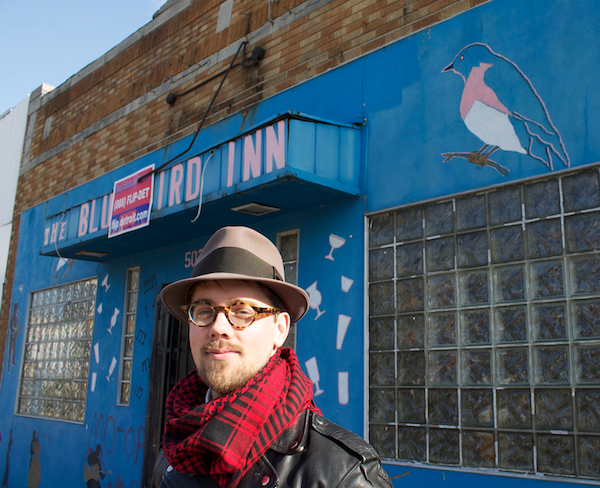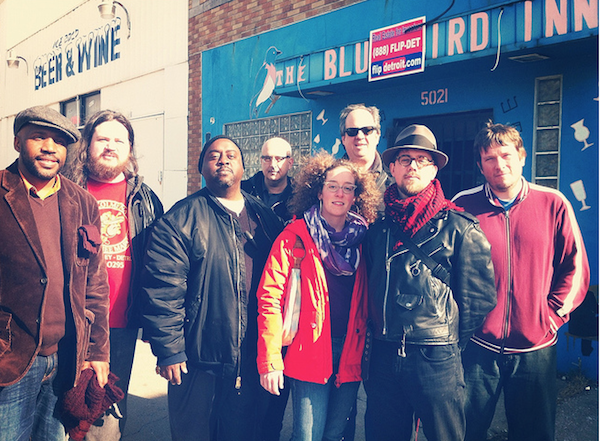Stirring the Blue Bird to sing: Introducing the Detroit Sound Conservancy
Carleton S. Gholz, an ex-pat teaching at Northeastern University in Boston, has plans for his home town. He is gathering an impressive group of Detroit music experts to create a sound conservancy. We like what we're hearing so far.
Every day lovers of Detroit sound lose another hero. As I write this, I have heard that Michael Davis, bass player for the seminal Detroit rock band the MC5, has passed away. In a parallel universe he must still be rocking. He was 68.
Every day lovers of Detroit sound lose another landmark. As I began to draft this I found out that the Latin Quarter on Grand Boulevard met the wrecking ball. The building was built as an entertainment pleasure palace. It’s terracotta walls were built over at some point in the ensuing years. They will never see the light of day again.
Every day lovers of Detroit sound lose the opportunity to celebrate and educate. As I write this, what is left of an exhibit to Detroit Techno put on by the Detroit Historical Museum in 2002 sits behind locked doors in buildings on Fort Wayne making it unavailable to the public and to researchers.
And every day the legacy that Detroiters do have of our music making, that immense sonorous panorama of activities and connections that lovers of Detroit sound here and around the world adore, becomes more fragmentary and harder to conserve.
As I write this, a lack of funds for staffing at the Detroit Public Library means that the E. Azalia Hackley Collection’s head curator Romie Minor spends multiple days a week away from what his primary task of preserving and conserving one of the finest African American performance archives in the world. The result is that the collection remains largely a “best-kept secret.“
In these troubled times, when Detroiters want to know what Detroit sound has meant and might continue to mean where should they turn? For those aware of them places like the Hackley and the archives at the Charles H. Wright Museum, as well as the personal collections and memories of countless Detroiters, are part of an intricate system of metaphorical marshes, a sonic ecology that have the ability to shore up our memories and, therefore, our imaginations against the storm surge of economic and social crisis.
However, this indigenous, urban, system of memory is constantly at risk, literally and figuratively, of being flooded over and washed away.
Detroit needs a sound conservancy.
We, current Detroiters, former Detroiters, and global lovers of Detroit sound, have had and continue to have opportunities to conserve Detroit’s rich musical heritage not only for us but also to current and future Detroiters. However, many times these opportunities are disparate, uncoordinated, and even ill conceived. Even when those opportunities are taken up and are successful – like the emergence of the Hackley Collection in the 1943 or, more recently, the creation of Exhibit 3000 a museum exhibit dedicated to the emergence of Detroit electronic music and culture — are virtually unknown. Because of this, it does seem appropriate to describe Detroit music lovers as refugees from the storm, unable to salvage what they have and so focused on survival amidst the continuing maelstrom that they are unable to celebrate the minor victories that the Lord still allows.
I too am an émigré from Detroit’s economic and social struggles. Unable to find sustainable work in Detroit last decade, I left for graduate school only to find that when I graduated with my Ph.D. there was still no job waiting for me back home. The Detroit Sound Conservancy, therefore, is my humble love letter to Detroit the city where I first became a journalist, teacher, DJ, and historian.
Over the last year, with the help of a growing cast of characters including musicians, historians, writers, archivists, librarians, filmmakers, photographers, nonprofit activists, and fans, I have gathered together all that I know — and continue to learn — about the state of Detroit’s musical heritage. What can be proactively done so that this rich interactive resource may still help us imaginatively and spiritually weather storms?
There are profound and heartening stories to tell.
There is Cynthia Korolov at the Archive of the Detroit Symphony in the Cass Corridor who, along with the founder of the Walter P. Reuther Archives Dr. Philip P. Mason, helped write the National Historical Publications and Records Commission grant that digitized the Detroit Symphony Orchestra’s analog tapes. There is radio jock John Penney out in Farmington Hills sifting through the history of Detroit blues and jazz music at the American Music Research Foundation. There’s Leo Early and the Friends of the Grande Ballroom who persist in their goal of historical landmark status for the Grande. There are scholars like Tim Retzloff carrying out oral histories with early DJs from gay clubs like the Iron Hinge in the early 1970s, and Denise Dalphond doing the same with dance musicians like the one we lost less than two years ago, Aaron Carl.
And, perhaps closest to my heart given my experience as a music journalist, there is Dan Sicko’s wife Amy Lobsiger and their daughter deciding how to best be stewards to her husband’s written and archival legacy after his passing from cancer last summer.
The Detroit Sound Conservancy wants to bring these Detroiters and their stories together. We want to coordinate and connect, establish standards and make stands, organize and orchestrate. Whether it’s telling the story of Detroit radio, from “Frantic” Ernie Durham to the Electrifying Mojo; enabling longtime scene activists like Zana Smith to protect her own private collection of flyers, photographs, and cassette tapes; or preserving the famous Blue Bird Inn before it’s torn down; the Detroit Sound Conservancy wants to engage Detroiters for Detroit sound. In other words, through our willful engagements we hope that some day the Blue Birds will sing again.
Before he passed, Michael Davis and his wife Angela began a non-profit called Music is Revolution in Portland, Oregon dedicated to music education. “Brothers and sisters,” they called us on their Web site, “Brothers and sisters, the time has come for each and every one of you to be a part of the solution: MUSIC IS REVOLUTION.”
I believe that the Detroit Sound Conservancy is part of the solution.
Join me.
Carleton S. Gholz, Ph.D. is a postdoctoral teaching associate in the Communication Studies Department at Northeastern University in Boston where he teaches as much Marvin Gaye as he does Antonio Gramsci. He is also the founder of the Detroit Sound Conservancy and member of the Friends of the E. Azalia Hackley Collection at the Detroit Public Library. He co-founded the Detroit DJ collective Paris ’68, co-authored a column on club culture in the Metro Times called the Subterraneans and is currently writing a book about Detroit music after Motown. Follow the Detroit Sound Conservancy on Twitter and Facebook.
Photos by Walter Wasacz






